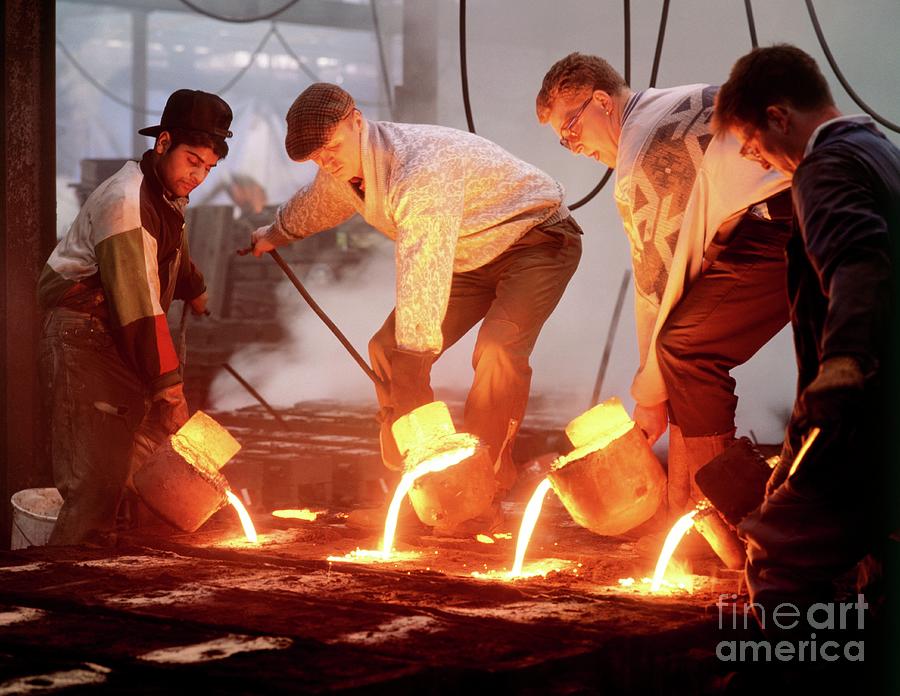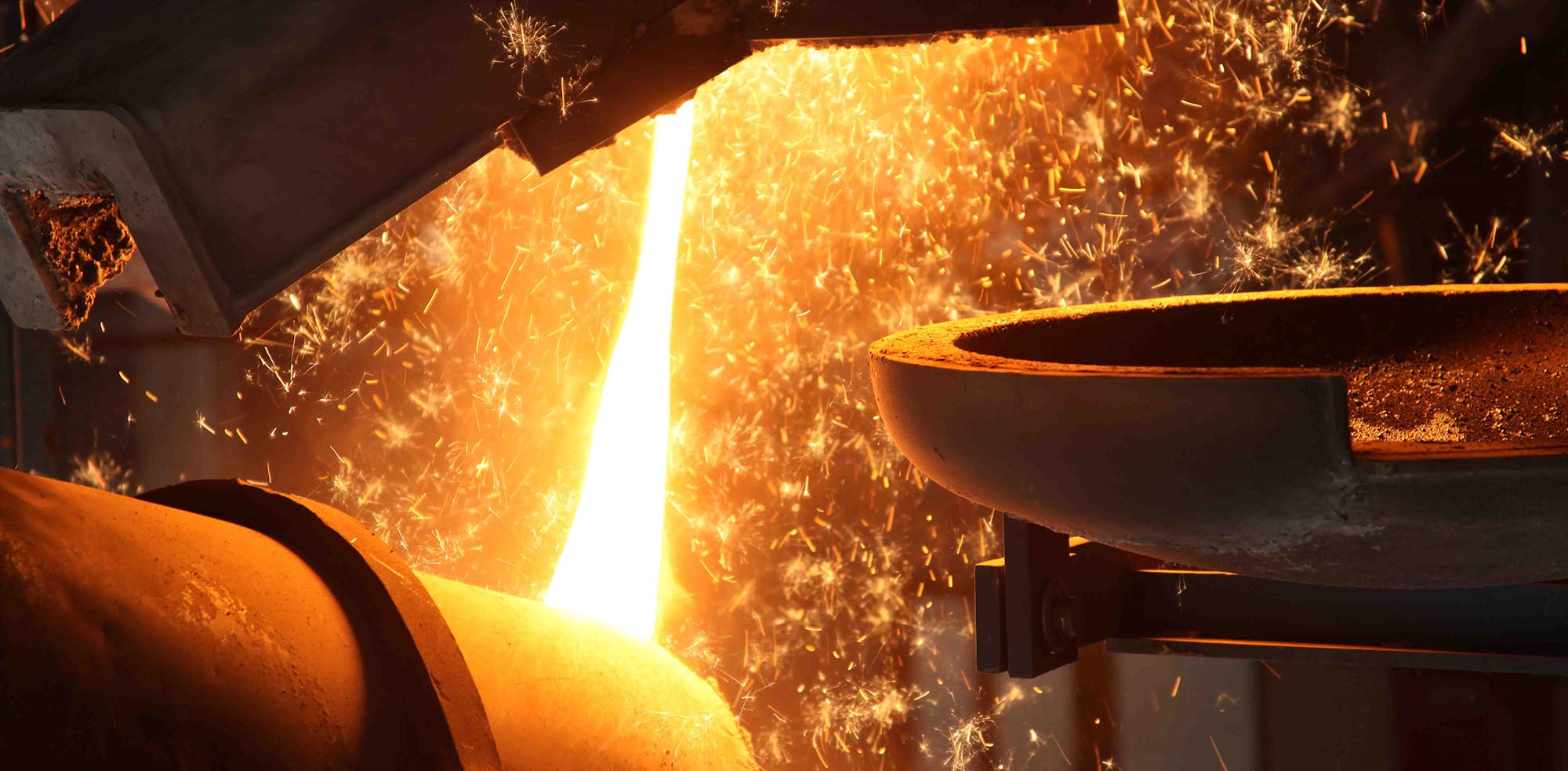How robotics and digital tools are redefining the Aluminum Foundry process
Wiki Article
Exactly How a Metal Foundry Adds To Sustainable Metal Manufacturing Practices
Metal foundries play a vital role in advertising sustainability within the metal manufacturing sector. By integrating recycled materials, they lower reliance on virgin sources and reduce ecological impacts. Energy-efficient melting processes further minimize energy consumption and emissions. The journey toward lasting practices includes more than simply reusing and power monitoring. It includes a broader dedication to ethical sourcing and cutting-edge technologies. The implications of these practices are considerable and warrant better examination.The Duty of Recycling in Metal Foundries
While metal production has typically depended on virgin products, the boosting focus on sustainability has led to a significant change in practices, specifically in metal foundries. Recycling has become a crucial part of this change, allowing foundries to repurpose scrap metal and minimize reliance on mined sources. By incorporating recycled materials right into their processes, foundries not only reduce ecological influence yet additionally lower manufacturing costs.Making use of recycled metals, such as steel, light weight aluminum, and copper, minimizes power consumption and lowers greenhouse gas discharges related to traditional mining and refining approaches. Foundries can accomplish top notch outputs by employing advanced sorting and processing modern technologies to assure the pureness of recycled materials. This focus on reusing fosters a round economy, where waste is minimized, and resources are made use of efficiently. Metal foundries play a crucial duty in advertising sustainable techniques within the metal manufacturing sector.
Energy-Efficient Melting Strategies
Energy-efficient melting methods are necessary for boosting sustainability in metal production. These techniques significantly lower energy intake during the melting process, which is one of one of the most energy-intensive phases in metal production. Technologies such as induction melting, resistance heating, and microwave melting deal enhanced effectiveness contrasted to traditional approaches. Induction melting, for circumstances, makes use of electromagnetic areas to generate warm directly within the metal, minimizing energy loss and offering precise temperature level control.Additionally, executing warm recuperation systems can even more improve efficiency by recycling and recording waste warm created throughout melting. Using sophisticated insulation products and enhancing heating system styles likewise add to energy cost savings. By adopting these ingenious melting techniques, metal foundries can decrease their carbon impact, reduce operational costs, and add to an extra lasting production landscape. The combination of energy-efficient methods not just lines up with environmental goals however likewise satisfies the expanding demand for accountable manufacturing methods in the metal sector.
Sustainable Sourcing of Raw Products
Lasting sourcing of basic materials is crucial for minimizing the ecological effect of metal production. This includes the enhanced application of recycled metals, the fostering of honest mining techniques, and initiatives aimed at regional sourcing. By prioritizing these methods, the sector can promote accountable source management and assistance regional economies.
Recycled Metal Application
Just how can sectors effectively minimize their ecological effect while fulfilling the growing need for metal? One substantial method is the use of recycled metal. By including scrap metal into their production processes, foundries can lower the removal of virgin products, consequently conserving all-natural resources and decreasing energy consumption. Recycled metals call for less power to procedure compared to their raw counterparts, leading to lower greenhouse gas emissions. In addition, making use of recycled metal assists draw away waste from land fills, promoting a round economic situation. Industries that prioritize recycled metal not just contribute to sustainability however additionally take advantage of expense financial savings related to decreased product purchase. Consequently, recycled metal utilization stands as a vital strategy for eco accountable metal production.Moral Mining Practices
While the demand for metals continues to increase, industries are progressively recognizing the value of honest mining techniques in ensuring accountable sourcing of raw products. Ethical mining includes a commitment to environmental stewardship, social obligation, and adherence to reasonable labor techniques. Business are now prioritizing collaborations with mines that demonstrate transparency in their procedures, lessening environmental impact and respecting local communities. This approach not just fosters a sustainable supply chain yet additionally improves the credibility of services involved. By executing strenuous standards and accreditations, sectors can fight prohibited mining activities and advertise the welfare of workers. Eventually, ethical mining techniques contribute substantially to a much more sustainable metal production community, lining up economic development with environmental and social stability.Local Sourcing Campaigns

Developments in Metal Casting Processes
Innovations in metal casting procedures are transforming the sector by integrating sophisticated recycling techniques that minimize waste. Energy-efficient melting methods are also being established to decrease power intake during manufacturing. Furthermore, the usage of cutting-edge mold products contributes to enhanced efficiency and sustainability in casting operations.Advanced Recycling Techniques
Advanced recycling strategies are changing metal casting procedures, substantially boosting sustainability in the market. These technologies concentrate on recycling and redeeming scrap metal, significantly reducing waste and the demand for virgin products. Methods such as hydrometallurgy and pyrometallurgy allow foundries to remove useful steels from used parts, guaranteeing effective source application. Additionally, advanced sorting and purification modern technologies boost the top quality of recycled steels, making them suitable for high-performance applications. This not just decreases the ecological footprint of metal production however also promotes a circular economy by promoting the reuse of materials. As these recycling approaches proceed to progress, they why not look here guarantee to further simplify procedures within foundries and add to a much more lasting metal manufacturing landscape.Energy-Efficient Melting Methods
While conventional melting methods have long been the backbone of metal casting, current innovations have actually presented energy-efficient techniques that markedly minimize energy consumption and exhausts. Technologies such as induction melting and electric arc heaters have actually acquired prominence, permitting specific control over temperature and minimizing the demand for fossil fuels. These approaches not only boost energy performance however also promote faster melting times, which translates to decrease operational costs. Additionally, developments in warm recuperation systems enable foundries to capture and reuse excess warmth produced try these out during the melting procedure. This alternative strategy to energy administration not just supports sustainable practices yet likewise placements metal foundries as leaders in the change in the direction of greener production procedures, better aligning with global sustainability objectives.Cutting-edge Mold Products
As the demand for even more efficient and lasting metal casting procedures expands, the expedition of ingenious mold materials has actually become a focal factor in the sector. Standard mold materials frequently contribute to ecological challenges, motivating the look for options that reduce waste and power intake. Recent developments include the growth of naturally degradable binders and recyclable composites, which not just improve mold and mildew performance but additionally reduce ecological influence. In addition, making use of 3D printing modern technology in mold development enables detailed styles that reduce product usage and make it possible for fast prototyping. These innovative products not just improve casting precision but likewise align with sustainability objectives, showcasing the sector's dedication to decreasing its carbon impact while maintaining premium manufacturing requirements.Minimizing Waste Through Advanced Technology
Cutting-edge innovations are transforming the metal manufacturing industry by considerably lowering waste and enhancing efficiency. Advanced data analytics and artificial intelligence algorithms make it possible for foundries to optimize production procedures, decreasing look these up and identifying ineffectiveness scrap material. Smart sensing units check tools efficiency in real-time, enabling for anticipating upkeep that reduces downtime and waste generation. In addition, additive production strategies, such as 3D printing, permit the creation of facility components with marginal product usage, considerably reducing waste compared to standard methods.
In addition, closed-loop systems are becoming extra common, in which scrap metal and byproducts are reused back into the production cycle, ensuring that products are utilized to their greatest capacity - Metal Foundry. This assimilation of innovation not just advertises source preservation but likewise boosts the total sustainability of metal production practices. By welcoming these improvements, foundries can add to a more sustainable future while preserving competitiveness in the marketplace
The Effect of Foundries on Carbon Impact Reduction
Foundries play an essential role in lowering the carbon impact of the metal production industry by implementing different lasting methods. By using energy-efficient technologies, such as electrical arc furnaces, these facilities considerably lower greenhouse gas discharges contrasted to conventional methods. In addition, foundries progressively embrace sustainable power resources, which additionally diminishes their dependence on fossil fuels.Recycling scrap metal is another critical practice that foundries utilize, saving sources and minimizing the need for virgin materials. This not only minimizes waste but likewise reduces down on the energy-intensive removal processes related to mining. The fostering of closed-loop water systems helps to lessen water usage and decrease wastewater discharge, adding to a much more sustainable procedure.
Via these initiatives, foundries demonstrate their commitment to environmental stewardship, resulting in a marked reduction in the overall carbon impact of the metal production sector. Their ongoing initiatives are critical in the change toward an extra lasting industrial landscape.
Regularly Asked Questions
What Sorts of Metals Are Most Typically Recycled in Foundries?
Aluminum, brass, copper, and steel are among one of the most frequently recycled metals in foundries. These metals are favored because of their high recycling prices, economic worth, and extensive accessibility, contributing significantly to industrial sustainability efforts.How Do Foundries Guarantee the Quality of Recycled Materials?
Foundries determine the high quality of recycled products through rigorous testing, arranging, and filtration processes. They implement innovative modern technologies to examine structure and eliminate impurities, ensuring that the recycled metals fulfill sector requirements for efficiency and safety and security.
What Qualifications Exist for Sustainable Foundry Practices?
Various qualifications exist for lasting foundry practices, consisting of ISO 14001 for environmental monitoring, ISO 50001 for energy management, and LEED qualification for sustainable structure methods (Aluminum Casting). These accreditations help guarantee adherence to ecological and sustainability criteria in proceduresExactly How Do Foundries Measure Their Carbon Impact Decrease?
Foundries gauge carbon impact decrease through tools like lifecycle evaluations, power audits, and exhausts tracking systems. They compare standard discharges to present outcomes, evaluating improvements in power efficiency, product usage, and renewable resource adoption in time.What Are the Economic Benefits of Lasting Metal Production?
Sustainable metal production uses economic benefits such as lowered functional expenses, increased performance, improved market competition, and possible federal government rewards. In addition, it cultivates development and brings in eco aware customers, eventually driving lasting earnings for organizations.Metal foundries play a crucial function in advertising sustainability within the metal production market. While metal manufacturing has actually typically depended on virgin materials, the boosting focus on sustainability has led to a substantial change in methods, especially in metal foundries. By including scrap metal right into their production processes, foundries can reduce the removal of virgin products, thus lowering and saving natural resources energy consumption. Foundries play an essential function in minimizing the carbon impact of the metal production industry by applying various lasting techniques. Recycling scrap metal is another vital practice that foundries employ, preserving sources and minimizing the requirement for virgin materials.
Report this wiki page